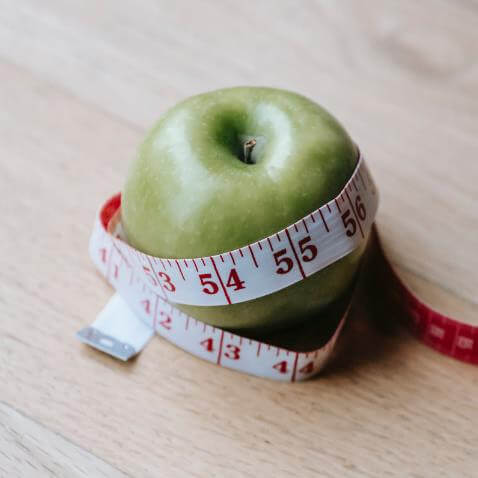Each day, we make countless decisions about what we put into our bodies. When it comes to managing our weight or building muscle, how we count calories in food can be a very important decision-making process. To start counting calories effectively, understanding both calories and macronutrients is essential. A calorie is a unit of energy used to measure the amount of potential energy stored in foods and beverages.
On average, one calorie is equal to 4.2 joules worth of energy. Our body can power physical movements like running or lifting weights through sufficient amounts of these caloric units. It makes them particularly important for people interested in developing muscle mass or shedding fat quickly!
There are three primary macronutrients present in food (carbohydrates,
proteins
& fats), each providing different amounts of potential energy (or calories). All three are necessary for optimum health and regularly must be counted when tracking dietary intake. Whether seeking
fat loss
or muscle gain goals by manipulating calorie intake correctly – understanding both classes will set you up with the best chance for success!
Calories – A Primer

We get calories from macronutrients to control energy in and out of your body. Counting calories is a good way to ensure you get enough nutrition to meet your goals while avoiding overeating and providing the necessary macronutrients for muscle growth or weight loss. The average person needs about
2000 calories
per day to maintain their current weight, but depending on physical activity and desired body composition, that may vary greatly from person to person!
With practice and proper counting comes knowledge of which food items provide the most nutrition with the least amount of caloric density. This can set up an easy way to calculate meal portions for better management of calorie intake.
The Importance of Macronutrients
Carbohydrates, fats, and proteins should all be included in your meal plans for a well-rounded experience. Macronutrients are the three components that make up most of our dietary intake. They provide energy and nutrients as a whole. Eating a balanced diet with plenty of each group helps ensure your body is getting the essential vitamins and minerals needed for optimal health.
Typical
balanced diet
macros relations
-
45-60% Carbohydrates
-
10-35% Proteins
-
20-35% Fats
but slightly more protein would be better if you’re actively trying to build muscle though! Carbohydrates are composed of starches & sugars which provide us energy by breaking down glucose available in the bloodstream quickly and keeping it at a constant level without declining suddenly for a longer time frame when compared with other macronutrient sources. Fats provide essential fatty acids not found in other foods. They also assist in transporting fat-soluble vitamins A, E, and K throughout our body while slowing digestion helping us feel full for longer periods throughout the day or night! Last but not least proteins form building blocks used to construct muscle fibers helping build them over time as part of our routine exercise routines.
• One gram (g) of carbohydrates provides 4 calories whereas 1 gram of protein provides 4 calories as well but fat provides 9 calories per 1 g serving! So they do not all provide the same number of energy units.
• Food sources high in quality proteins include lean meats like poultry & fish as well as dairy products, while good carbohydrate sources could come from whole grains such as oats or rice or starchy vegetables like potatoes along with plant-based complex sugar found in fruits. Good fat source mainly comes from nuts/seeds, oils (olive/coconut), avocados, etc which are all pretty low-calorie options -allowing you to enjoy much fuller servings during meal times without worrying about extra kilograms on the scale unnecessarily!
By knowing where our daily needs come from and counting them accordingly, we can tap into power discretely offered by these extraordinary sets of fundamental resources, striving to achieve our own goals. Be it losing weight or gaining muscle, whichever one may desire, understanding the intricacies offered through balancing out the right amount of necessary nutrient content available within food will go a long way toward assisting successful outcomes!
Weight Loss through Calorie and Macronutrient Management

For those seeking to
lose weight
, knowing how to count calories in food is essential. The key is understanding the optimal balance of macronutrients and timing meals correctly – without relying on guesswork or not so trusted traditional methods. For example, after consuming a meal containing 600 kcal, you would likely want to keep track of these details such as 55g carbohydrates, 35g proteins, and 25 g fats contained within it, and adding the net total intake every day! You can use this information to log your daily intake or you can set weekly goals for macronutrient ratios – making sure that on average you’re meeting them over the week.
Additionally, tracking progress is also very important when trying to shed some pounds – measuring Body Mass Index(BMI) as well as taking photos routinely over a certain duration tracking results from before/after will help you determine a rough estimation of any progress made. We are adhering closely to achieving our desired outcomes!
After all, no matter what, many people overlook the major point that all diets come down to simplifying translation: Calories In vs. Calories Out!! Careful management while leading a balanced lifestyle should result in better, longer-lasting outcomes for days ahead!
Muscle Gain through Calorie and Macronutrient Management
Gaining
muscle mass
requires a unique approach to calorie and macronutrient management. On one hand, it is essential to eat enough calories to support the calorically expensive process of constructing new muscles. And on the other, it is important to eat all three macronutrients in sufficient amounts, plus an abundance of proteins.
The exact amount required for muscle growth varies from person to person. However, general experts recommend consuming 1-1.8g of protein per kg body weight per day or more if muscular hypertrophy is your main goal and isn’t satisfied by eating just whole food alone. Further, vegetarian people might need to look at alternative protein options such as hemp powder for an equal outcome – but generally, beef & chicken should suffice bulk up! Gaining muscle also involves getting some extra calories which can be developed through snacks/shakes consumed right before and after the workout routine, and this helps the body recuperate quickly while providing essential fuel in the later stages of workouts. A combination of long & short-term caloric surplus (100 – 500 calories daily) can assist in building blocks whilst maintaining a healthy balance throughout the training period without sabotaging well-being entirely which often results when trying to achieve similar goals much too fast!
Along with tailored nutrient intake plans, sleeping correctly ensures appropriate recovery phases when undergoing continuous exercise activities. Less sleep duration may directly lead to fatigue and poor performance due to a lack of enthusiasm, motivation lacking quality, and fewer nutrition benefits offered by downing sufficient quantity during bedtime!
Step-by-Step Guide on How to Count Calories

1. Figure out your goals
If you are trying to lose weight, create a calorie deficit of 500-1000 calories daily. Eating fewer calories than normal will cause your body to burn stored fat for energy. If you want to gain muscle, consume more calories than you need and ensure a portion of that goes towards protein consumption.
2. Calculate your optimal calorie intake for the desired outcome
Calculate your
basal metabolic rate
(BMR): this will give you an idea of how many calories you need on any given day just to stay alive at rest without any physical activity. For weight loss, reduce this number by 500-1000 depending on your desired daily caloric deficit, and add 300-500 if gaining muscle is the goal.
3. Track what you eat throughout the day
Keep track of everything that goes into your stomach throughout the day and don’t forget beverages! Weighing
food
Measuring items is much more accurate than measuring based on eyesight. Keep track of all numbers and label them appropriately, whether it’s in an app or an old-school notebook—so sodas, condiments, sweeteners, etc. Anything calories-related should be logged to ensure a properly balanced diet and meal tracking success!
4. Look up statistics found on nutrition labels
To accurately assess which foods contain higher/lower amounts of empty calories, familiarize yourself with the information found under “nutrition facts” listed on packaging labels or online from restaurant menus. Find keywords such as ‘sugars’ or abbreviation ‘carbohydrate’ so that you can better understand what it contains regarding grams and its calorie count per serving size displayed below them – most companies provide nutritional values per 100g as well which serves as a great alternative if trying to increase muscle mass or cut back fat % in body composition goals!
5. Use next-level tools & apps for recipes & calorie databases
As always there are plenty of tools out there available for use when it comes time to calculate total country intake – utilize recipe & nutrition calculator applications like ‘
MyFitnessPal
that conveniently hold vast amounts of database options featuring various meals/dishes broken down their calorie counts while also allowing users full customization over additional elements added including oil seasonings et cetera! Consider investing in tools such as these not only save time but also lead to better accuracy within the tracking process overall 🙂
6. Have Fun!
Nutrition count isn’t complicated once some experience has been accumulated. Just lay one step at a time building habits surrounding gleaning knowledge about where exactly those calorific figures come from specifically when eating out alongside measuring food at home afterward by doing so outcomes become feasible and achievable 🙂
Key Takeaways
Health begins from knowledge. Understanding the role of calories and macros, their importance, and how to track them can help you reach your goals more effectively. Proper counting techniques allow you to choose foods full of essential vitamins and minerals without worrying about overeating or gaining weight unexpectedly. Additionally, understanding the significance of exercise in calorie and macro-nutrient management is also important for long-term gains when focusing on either muscle growth or weight loss goals! Finally, utilizing applications like MyFitnessPal and other available tools makes it easier to accurately track caloric consumption. Set up the foundation needed to stay ahead of the game while keeping an eye on desired body composition!

 By myulikeadmin
By myulikeadmin



